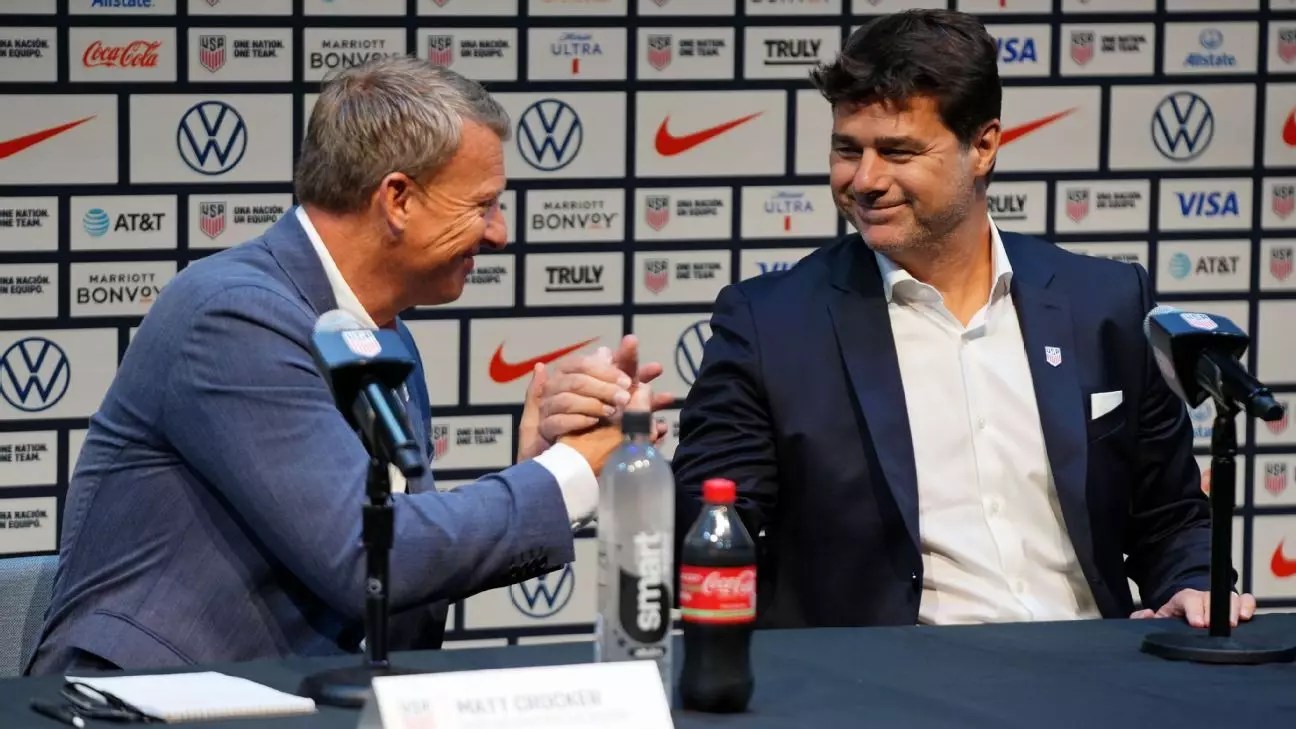The appointment of Mauricio Pochettino as the head coach of the United States men’s national soccer team signals a pivotal moment in American soccer history. The seasoned Argentine coach openly recognized the high standard set by the U.S. women’s national team, which boasts a stunning record of four World Cup championships and five Olympic gold medals. “We are here because we want to win,” he stated during his first press conference, reflecting a no-nonsense approach that will likely be central to his coaching philosophy. His call for aspiration and ambition emphasizes the need for this emerging generation of male players to cultivate a winning mindset akin to that of their female counterparts.
Pochettino steps into a daunting role as the 10th coach of the U.S. men’s national team in just 14 years. This inconsistency raises questions about the structural stability of American soccer and what it takes to build a cohesive and competitive team. The last time the U.S. men reached the World Cup quarterfinals was in 2002; a sobering reminder of the challenges Pochettino faces. Still, he seems optimistic, referring to the current squad as a “very good generation of players.” Such cautious optimism is essential as he has inherited a talent pool that, while promising, lacks experience on the world stage.
Pochettino also mentioned the importance of collective play, underscoring his awareness that individual talent alone will not lead to success. A hallmark of his coaching style has always been fostering teamwork and unity, traits he will need to instill as he prepares to navigate the intricacies of international competitions.
The Path Forward: Strategy and Vision
One of the most concerning aspects for Pochettino is the limited training time with his players before pivotal matches. With just eight one-week training periods available for preparation, integrating his strategies and ensuring players understand their roles could prove to be a complex task. The coach’s experience in various leagues and his tactical acumen will be put to the test as he endeavors to blend established players with newcomers effectively.
Moreover, the gaps in key positions such as goalkeeper and central defense present immediate issues that demand attention. U.S. soccer has struggled to maintain discipline on the field, an area where Pochettino must inject his philosophy. Known for his meticulous approach and mental preparation, it will be fascinating to see how he addresses these intricacies to unify the team both on and off the pitch.
What sets Pochettino apart is not just his vision but the depth of his experience as a coach in some of the world’s most prestigious leagues. From leading Espanyol in Spain to his stints with Southampton, Tottenham, and Paris Saint-Germain, he has cultivated a rich understanding of the game that transcends various football cultures. His recent appointment at Chelsea also lends insight into the high-pressure realm of coaching at an elite level, which will be instrumental as he approaches international competitions.
Moreover, the influence of Emma Hayes, the current coach of the U.S. Women’s National Team, cannot be understated. As someone who played a pivotal role in Pochettino’s recruitment, Hayes’ presence symbolizes a collaborative spirit among U.S. soccer coaches. This camaraderie could be vital in fostering a more unified approach to developing soccer talent across both the men’s and women’s teams.
Looking ahead to the 2026 World Cup, which will kick off on June 12 in Inglewood, California, Pochettino has ample time to craft his vision. However, the road is fraught with challenges. Friendlies against Panama and Mexico will serve as early tests of his coaching mettle, while the impending Concacaf Nations League quarterfinal will provide a platform to measure the team’s progress. With Pochettino at the helm, U.S. Men’s Soccer enthusiasts can anticipate a new era—one that seeks to not only emulate the success of the U.S. women’s team but to establish a legacy of its own.


Leave a Reply